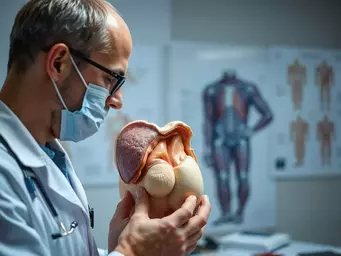Weight Management Tips for Men

What if a simple hormonal imbalance is the reason behind your unexplained fatigue and weight gain? Understanding the crucial role of testosterone in men's health can be the key to unlocking a healthier lifestyle. In this article, we explore how low testosterone affects weight management and what you can do to regain control.
What You Will Learn
- Low testosterone, or hypogonadism, can lead to fatigue, increased body fat, and reduced muscle mass.
- There is a significant link between obesity and low testosterone levels, creating a cycle that can hinder weight management.
- Lifestyle changes, including balanced nutrition and regular exercise, are essential for managing testosterone levels and weight.
- A holistic approach combining testosterone therapy with healthy lifestyle modifications can greatly improve overall health.
- Prioritizing sleep hygiene and hydration plays a critical role in hormonal balance and effective weight management.
Low Testosterone and Weight Management: Key Impacts & Strategies
Understanding the interplay between low testosterone and weight management is crucial for men's health. The visual below highlights key areas of impact and effective strategies.
Impacts of Low Testosterone
- Fat tissue converts testosterone into estrogen.
- Reduced motivation for physical activity.
- Mood changes contribute to emotional eating.
- Decreased muscle mass, lower metabolic rate.
Key Weight Management Strategies
- Balanced Nutrition: Whole foods, lean proteins, healthy fats.
- Regular Exercise: Strength training & cardio.
- Stress Management: Meditation, deep breathing.
- Quality Sleep: Aim for 7-9 hours to support hormone balance.
Understanding Low Testosterone and Its Impact on Weight Management
Low testosterone, often referred to as hypogonadism, is a condition that affects many men as they age. It refers to the body's inability to produce sufficient testosterone, which is crucial for various functions including mood, energy, and weight management. Have you ever felt a persistent sense of fatigue or noticed an an increase in body fat, despite maintaining a similar diet? These could be signs of low testosterone, and understanding this condition is the first step toward addressing its impacts.

In particular, low testosterone can lead to significant changes in body composition. As an endocrinologist, I often see patients struggling with weight management, which can be exacerbated by hormonal imbalances. Recognizing the signs and symptoms of low testosterone can empower you to take control of your health. Let’s delve deeper into what low testosterone means and how it affects men.
What is Low Testosterone and How Does It Affect Men?
Low testosterone is characterized by levels that fall below a normal range, leading to various physical and emotional symptoms. Common symptoms include:
- Fatigue and decreased energy levels
- Reduced libido and sexual dysfunction
- Increased body fat and loss of muscle mass
- Depression or mood changes
Understanding the role of testosterone in the body is vital. This hormone is essential not only for building muscle but also for maintaining energy levels and mood stability. When levels are low, it can lead to a cascade of effects, influencing not just physical health but also emotional well-being.
The Link Between Obesity and Testosterone Deficiency
Research indicates a strong link between obesity and low testosterone levels. Men with obesity often experience lower testosterone, which can create a vicious cycle. Obesity can lead to hormonal changes, and in turn, low testosterone can make weight management more challenging. For more information on the link between obesity and weight management, you can refer to resources from the American Diabetes Association. Consider these points:
- Fat tissue converts testosterone into estrogen, further reducing testosterone levels.
- Low testosterone can lead to reduced motivation for physical activity.
- Mood changes associated with low testosterone may contribute to emotional eating.
By addressing both obesity and testosterone deficiency simultaneously, you can improve overall health and achieve better weight management results. At Hypogonadal Health, we emphasize the importance of understanding this link as a fundamental step toward better health.
Impact of Low Testosterone on Metabolism and Body Composition
Low testosterone significantly affects metabolism and body composition. When testosterone levels are low, the body tends to store more fat and lose muscle mass. This shift can decrease metabolism, making it harder to lose weight. Here’s how it impacts your body:
- Lower testosterone levels can lead to decreased muscle mass, which burns fewer calories at rest.
- Fat accumulation around the abdomen is common, which is associated with higher health risks.
- Metabolic rate may slow down, making weight loss efforts less effective.
Recognizing the interplay between testosterone and metabolism is crucial for effective weight management. If you suspect low testosterone may be impacting your health, it's important to seek guidance from healthcare professionals who specialize in hormone health. Together, we can explore treatment options that not only improve testosterone levels but also enhance overall well-being.
Frequently Asked Questions About Low Testosterone and Weight Management
Here are some common questions about low testosterone and its effects on weight management:
- Q: What are the main symptoms of low testosterone?
- A: Key symptoms include fatigue, decreased energy levels, reduced libido, increased body fat, loss of muscle mass, and mood changes like depression.
- Q: How does obesity relate to low testosterone?
- A: Obesity and low testosterone are closely linked in a cyclical relationship. Fat tissue can convert testosterone into estrogen, further lowering testosterone levels, while low testosterone can reduce motivation for physical activity and contribute to emotional eating, making weight management more difficult.
- Q: Can low testosterone affect my metabolism?
- A: Yes, low testosterone can significantly impact metabolism and body composition. It often leads to decreased muscle mass and increased fat storage, which in turn slows down the metabolic rate, making weight loss challenging.
- Q: What lifestyle changes can help manage low testosterone and weight?
- A: Effective lifestyle changes include balanced nutrition (whole foods, lean proteins, healthy fats), regular exercise (strength training and cardio), stress management techniques, and prioritizing 7-9 hours of quality sleep per night.
- Q: Is testosterone therapy the only solution?
- A: While testosterone therapy can be a crucial part of treatment, a holistic approach combining therapy with natural lifestyle strategies (nutrition, exercise, stress management, sleep, and hydration) is often recommended for optimal results and overall well-being.
We Want to Hear From You!
Have you noticed any changes in your energy levels or body composition recently? What steps have you taken to address your health? Share your thoughts below:
Summarizing Key Weight Management Strategies for Men with Low Testosterone
At Hypogonadal Health, we understand that managing weight when dealing with low testosterone can feel like a daunting challenge. However, there are proven strategies that can significantly enhance your results. By integrating lifestyle modifications tailored to your needs, you can not only improve your hormone levels but also achieve better weight management.
Here are some effective lifestyle modifications that can benefit men experiencing low testosterone:
- Balanced Nutrition: Focus on whole foods, lean proteins, healthy fats, and plenty of fruits and vegetables. For guidance on balancing food intake and physical activity, the CDC provides helpful tips.
- Regular Exercise: Incorporate both strength training and cardiovascular workouts to boost metabolism. Resources from the National Institute of Diabetes and Digestive and Kidney Diseases emphasize the importance of physical activity.
- Stress Management: Utilize techniques like meditation and deep breathing to reduce cortisol levels, which can affect weight.
- Quality Sleep: Aim for 7-9 hours of restful sleep each night to support hormone balance.

These modifications not only support weight loss but also enhance overall health and well-being. Implementing them consistently can lead to long-term success in managing testosterone levels and body composition.
Encouraging a Holistic Approach: Combining Therapy with Natural Strategies
Combining testosterone therapy with natural lifestyle strategies offers a comprehensive approach to achieving your weight management goals. It's not just about replacing hormones; it's also about optimizing your lifestyle for the best outcomes. By addressing both aspects, you can significantly improve your hormonal balance and overall health.
Consider the following strategies for a holistic approach:
- Engage in regular consultations with a healthcare provider to monitor hormone levels and adjust therapy as needed.
- Adopt a nutrient-rich diet that supports your body’s unique hormonal needs.
- Incorporate physical activity tailored to your preferences and ability, making it enjoyable to sustain.
- Utilize mindfulness practices to stay focused on your health journey and manage stress effectively.
This combination ensures that while you may be undergoing testosterone therapy, you're also actively supporting your body’s natural processes.
Emphasizing the Importance of Sleep Hygiene and Hydration
As an endocrinologist, I cannot stress enough how crucial sleep hygiene and hydration are to managing weight and testosterone levels. Quality sleep supports hormone production and helps regulate metabolism. Without it, your body may struggle to maintain hormonal balance, hindering your weight management efforts.
Here are essential tips for improving sleep hygiene and hydration:
- Establish a consistent sleep schedule by going to bed and waking up at the same time each day.
- Create a calming bedtime routine to signal your body that it’s time to wind down.
- Stay hydrated throughout the day by drinking plenty of water and limiting sugary beverages.
- Avoid large meals and caffeine close to bedtime to improve sleep quality.
By prioritizing these areas, you can create a solid foundation for successful weight management and hormonal health.
Recap of Key Points
Here is a quick recap of the important points discussed in the article:
- Low testosterone, or hypogonadism, can lead to fatigue, reduced libido, increased body fat, and mood changes.
- Obesity and low testosterone are interconnected, creating a cycle that complicates weight management.
- Low testosterone negatively impacts metabolism and body composition, leading to fat accumulation and loss of muscle mass.
- Effective weight management strategies include balanced nutrition, regular exercise, stress management, and quality sleep.
- A holistic approach combining therapy and natural lifestyle strategies can optimize health and hormone balance.
- Prioritizing sleep hygiene and hydration is crucial for supporting hormone production and regulating metabolism.
Popular Posts
 What if the key to unlocking your vitality lies in understanding the hormones that influence your bo
What if the key to unlocking your vitality lies in understanding the hormones that influence your bo
 Recognizing that your environment can significantly influence your hormonal health is crucial. Have
Recognizing that your environment can significantly influence your hormonal health is crucial. Have
 Have you considered how fluctuations in your testosterone levels might affect your daily energy and
Have you considered how fluctuations in your testosterone levels might affect your daily energy and
 Trauma to the testicles can have profound effects on hormonal health, but understanding the causes a
Trauma to the testicles can have profound effects on hormonal health, but understanding the causes a
